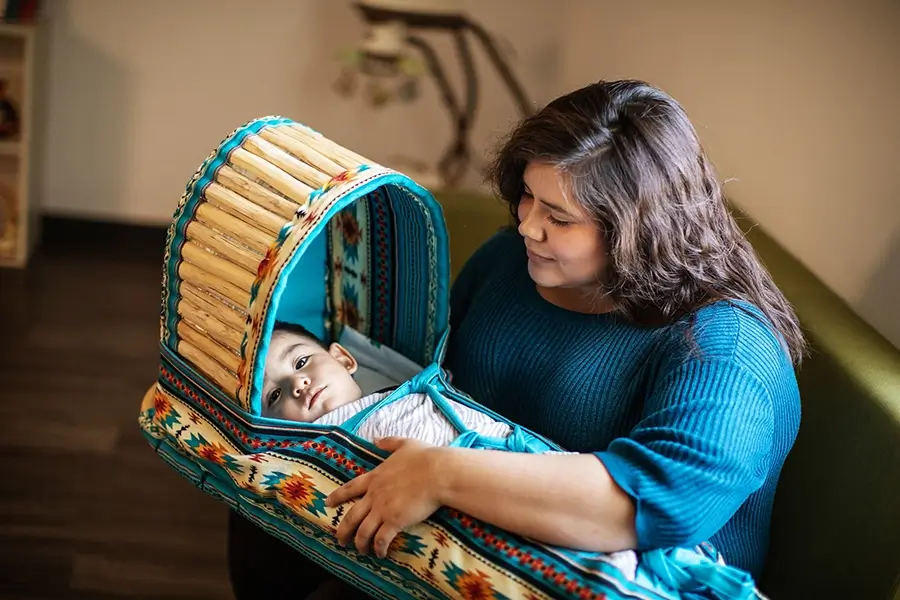featured_seasonal_and_giftsYour Monthly Gift, Their Endless Possibilities. Join our Monthly Giving Circle and make your impact today!

At Patina Wellness Center (PWC), Native American Connections offers a unique, family centered approach to substance use treatment that recognizes the healing power of staying together.
Patina Wellness Center welcomes single parents, couples, and couples with young children (ages 0 to 5), providing a supportive environment where families can begin the recovery journey together. This model is grounded in cultural values, trauma informed care, and the belief that healing is most effective when families remain connected.
Unlike traditional treatment programs that often separate parents from their children, Patina Wellness Center allows families to room together. Accommodations include two to four single beds for parents and older children, with cribs or bassinets provided for infants. This intentional setup ensures that children stay with their parents throughout the recovery process, reinforcing attachment and emotional stability.
For parents of newborns, daily bonding is encouraged as a vital part of early development and personal healing. This approach nurtures both the parent and child relationship and the individual’s recovery journey.
To ensure parents can fully participate in treatment, PWC offers child watching services during programming hours, Monday through Friday. Children engage in age-appropriate activities and learning experiences that promote growth and development while their parents attend individual and group sessions.
Outside of programming hours, parents remain responsible for their children’s care, but they are never alone. Families share all meals together, building routines and reinforcing unity. A dedicated nutrition room on the residential floor allows families to store snacks and WIC supplies and supports the needs of nursing mothers and young children.
All parents in the program participate in Positive Indian Parenting classes, which blend practical parenting skills with Native cultural teachings. These sessions strengthen family bonds, restore cultural identity, and build confidence in parenting.
The program also provides support for families with open Department of Child Safety (DCS) cases, helping parents navigate the system while working toward reunification. Transportation is available for pediatric appointments and essential family services.
By keeping families together and supporting their emotional, physical, and cultural needs, Patina Wellness Center’s family model creates an environment where healing happens as a unit. Parents receive the care they need without having to be separated from their children. This approach honors the importance of family in both Native communities and long term recovery.
For more information about Patina Wellness Center and our family program, visit our addiction treatment page. Reach our team! Contact 602-424-2060 or intake@nativeconnections.org.
Our traditions are the foundation of our organization - explore, learn, and utilize resources available for all.

Get the support you need with health, housing, and community services available at Native American Connections.

Your support changes lives and builds healthy communities. Find ways to get involved.

A "chronically homeless" individual is defined to mean a homeless individual with a disability who lives either in a place not meant for human habitation, a safe haven, or in an emergency shelter or in an institutional care facility if the individual has been living in the facility for fewer than ninety (90) days and had been living in a place not meant for human habitation, a safe haven or in an emergency shelter immediately before entering the institutional care facility. In order to meet the ‘‘chronically homeless’’ definition, the individual also must have been living as described above continuously for at least twelve (12) months or on at least four (4) separate occasions in the last three (3) years, where the combined occasions total a length of time of at least twelve (12) months. Each period separating the occasions must include at least seven (7) nights of living in a situation other than a place not meant for human habitation, in an emergency shelter or in a safe haven.
Federal nondiscrimination laws define a person with a disability to include any (1) individual with a physical or mental impairment that substantially limits one or more major life activities; (2) individual with a record of such impairment; or (3) individual who is regarded as having such an impairment. In general, a physical or mental impairment includes, but is not limited to, examples of conditions such as orthopedic, visual, speech and hearing impairments, cerebral palsy, autism, epilepsy, muscular dystrophy, multiple sclerosis, cancer, heart disease, diabetes, Human Immunodeficiency Virus (HIV), developmental disabilities, mental illness, drug addiction, and alcoholism.